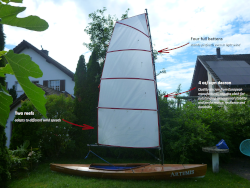| Language and Social Media |  |
 |
 |
 |
ARTEMIS Sailing Canoe Features
Versatile, efficient and ergonomic
The historic sailing canoe was the boat of the english and american middle and upper class between 1850 and 1950
for adventure, sports and travel.
We have rediscovered, reimagined and modernized it.
The ARTEMIS sailing canoe is a versatile ultralight 50-50 expedition canoe that you can paddle as well as sail.
Sailing
ARTEMIS is a joy to sail. She is as lively and responsive as a racing dinghy. Agile, experienced sailors with good balance sit on the side deck, but there is no need to. You can as well reef and remain seated in the cockpit seat. With wind from abeam or abaft, the boat will plane easily and and is therefore faster than other 50-50 sailing canoes.
We support three rig options. All our rigs can be hoisted, reefed or hauled down on the water and stowed completely in the boat:
|
|
The fully battened 4.3 sqm lugsail (MACGREGOR specification) is a good all-round sail with an outstanding price-to-performance ratio. The ARTEMIS plans contain building instructions for the wooden spars, and Bootsbaugarage can also supply a set of wooden or carbon spars on request. |
|---|---|
|
|
The 5.4 sqm dacron sail (BUFFLEHEAD specification) with its carbon mast und boom has outstanding efficiency. It is fully battened, so has a perfect shape even in very light wind, can point high and go fast and is therefore used for big cruises and regatta sailing |
 |
The 6.2 sqm dacron racing sail with carbon rig (MONSTER specification) is for experienced, active and sporty sailors who want to be particularly fast. It is also fully battened, ensuring perfect shape. |
Paddling
You can paddle ARTEMIS with a single or with a double paddle. The canoe has a very stable position in the water, runs well straight ahead and behaves very good-naturedly and predictably in waves. This makes it safer than a kayak in extreme situations. Nature photographers can take their hands off the paddle without tipping over. The HUGH HORTON Venice seat is completely adjustable, adapts to any paddling position and supports different sitting positions.
Adventure cruising and travelling
The boat has enough stowage area to carry lightweight camping gear, food and water for three days. Don't forget
outdoor clothes, sleeping bag and a mattress, and go cruising. Sit on the very ergonomic
HUGH HORTON VENICE cockpit seat all day - no need to hike out.
This is the reason why cruising an ARTEMIS can be so relaxing and comfortable.
I like to sleep in the canoe, under a mosquito-proof cockpit tent.
Performance cruising and raids
Sailing or paddling - or both of that together? ARTEMIS provides performance under sail and paddle and is one of the most comfortable boats I know. The consistently good placings over the last few years show that she is an excellent choice for races, endurance regattas and raids.
Transport
With a cartop weight of 23 - 25 kg, ARTEMIS is light enough to be cartopped. You can load her on the roof rack without assistance. On land, we use a canoe trolley or just take her on the shoulder.
Building
ARTEMIS Mk II can be purchased as complete boat or as
hull. The easiest way to build an ARTEMIS sailing canoe completely yourself is from a
kit, but plans are also available.
The plans instructions contain lots of photos,
information on each building step, how to join the plywood, how to mark the shapes of the panels, how to use
epoxy. The kit instructions are even more detailed. You can use them as a course on
boatbuilding rather than a simple plan.
Expect about 100 to 120 hours if you build from a kit and some more if you build from plans.
As building space, a standard carspace is quite adequate.
Versatlity
It no longer surprises me that I am out and about much more often with ARTEMIS than with my other boats. It is so easy to launch her and take her for a spin. I hear the same thing from all the sailors and paddlers who have built an ARTEMIS sailing canoe.
 An afternoon on the water or an extended cruise? 50-50 sailing canoes are the most versatile boats you can think of.
"Sail when you can, paddle when you want".
An afternoon on the water or an extended cruise? 50-50 sailing canoes are the most versatile boats you can think of.
"Sail when you can, paddle when you want".